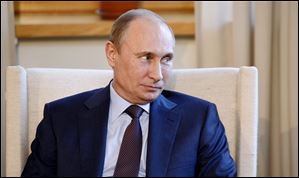
Commentary
Putin playing politics with Snowden
6/26/2013
Russian President Vladimir Putin and Finnish President Sauli Niinisto, unseen, talk at the presidential summer residence Kultaranta in Naantali, Finland.
The reasons Russia refused Tuesday to extradite National Security Agency leaker Edward Snowden after he arrived in Moscow while on the run from U.S. justice are primarily political and have little to do with Russia’s national interest.
Russian Foreign Minister Sergey Lavrov announced Tuesday that Mr. Snowden could not be extradited because he had not crossed the border, indirectly backing reports that Mr. Snowden had remained in the transit zone of Moscow’s Sheremetyevo International Airport without crossing the official border at the passport control.
Hours later, Russian President Vladimir Putin told reporters while on an official visit to Finland that Mr. Snowden had broken no laws in Russia.
He then gave an updated excuse to refuse the extradition request by noting that Russia and the United States do not have an extradition agreement.
To be sure, Mr. Snowden was reportedly carrying laptop computers with classified documents that may have included the particulars of alleged U.S. surveillance programs that might have targeted Russia. Though Mr. Putin supposedly told Russian reporters traveling with him in Finland, as reported by the New York Times, that Russia’s security services “are not engaged with him and will not be engaged,” counterintelligence experts in Russia and the United States have suggested that chances are about nil that Russian spy agencies had not yet interviewed Mr. Snowden and copied the relevant data from his laptops.
If Russian security services have copied the files, returning Mr. Snowden to the United States — with or without his laptops — would reveal to U.S. authorities exactly what secrets the Russians gleaned from those laptops. Russian spy agencies would not be in favor of that.
But the main reason Mr. Putin refuses to cooperate in Mr. Snowden’s case is purely political.
Mr. Putin has fanned anti-U.S. hysteria ever since the Sergei Magnitsky Rule of Law Accountability Act — which Mr. Putin likes to cast as a U.S. assault on Russia’s sovereignty — was passed last year. Prompted by a quarter-billion-dollar corruption scandal in Russia, the law covers all foreign nations, denies American visas to corrupt officials and human-rights violators, and freezes their U.S. bank accounts.
Since then, Mr. Putin — a former KGB career officer with associates accused of corruption — has been on President Obama’s case.
Only last month, Kremlin-controlled television stations across Russia showed pictures of a U.S. diplomat — with a cap worn backward over a blond wig — held face-down on the sidewalk of a Moscow street.
Kremlin-affiliated media alleged that the spy scandal involved a U.S. attempt to recruit a high-level Russian security official with a goal to “destabilize” Russia’s southern region that is prone to terrorist attacks by militant Muslim radicals.
The White House has downplayed the scandal and has maintained that the U.S. and Russian spy agencies have increased their mutual cooperation since the Boston Marathon bombing that was blamed on two Chechens, an ethnic native group in southern Russia. The Kremlin has made no such statements but has smugly exaggerated U.S. offers of such cooperation.
In Mr. Snowden’s case, U.S. Secretary of State John Kerry said the United States expected reciprocity from Russia after extraditing seven Russian criminals to Russia during the last two years.
The Kremlin apparently disagrees.
Kremlin-controlled media cite cases listed in the so-called “Report on the Situation with Human Rights in Certain States” issued by Russia’s ministry of foreign affairs.
In that report, Russia — a country with a dismal human-rights record and a history of contract hits on journalists that are rarely investigated — alleged that “extraterritorial application of American laws affects Russian-American relations most seriously.
“It leads to violations of the basic rights and freedoms of Russians, including arbitrary arrests and abductions from third countries, ill-treatment, criminal prosecution based on the basis of evidence given by false agents and doubtful evidence [cases against Viktor Bout and Konstantin Yaroshenko are the most striking examples],” the report stated, citing the cases of two Russian citizens who are serving prison sentences in the United States for arms smuggling and drug trafficking, respectively.
The bottom line is that Russia’s lack of cooperation on Mr. Snowden stems from Mr. Putin’s self-preservation instinct that drives him to blame all Russian ills on the United States.
Mike Sigov, a former Russian journalist in Moscow, is a U.S. citizen and a staff writer for The Blade.
Contact Mike Sigov at: sigov@theblade.com or 419-724-6089.